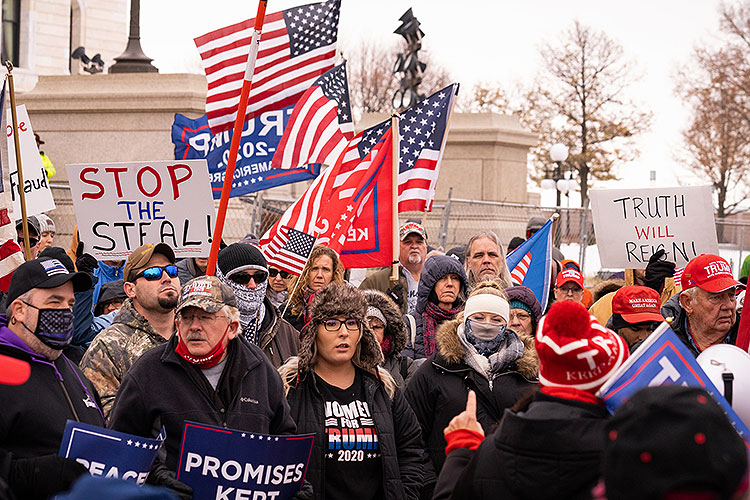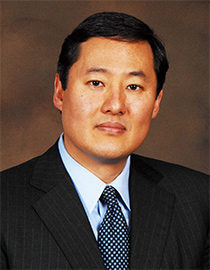
Critics have complained bitterly that Senate Majority Leader Mitch McConnell and other Republican leaders have not pressured President Donald Trump into conceding the victory to Democrat Joe Biden. Trump's attacks against the U.S. voting process undermine democracy, they say. (Photo by Gage Skidmore via Flickr | CC BY-SA 2.0)
As President Donald Trump disputes his election loss and threatens to create the most significant Constitutional crisis since the Civil War, many Republican leaders face a quandary: Do they risk Trump's ire by acknowledging the risks posed by his attacks, or do they hold to strategic silence as the crisis plays out hour by hour?
At this defining moment in American history, silence is winning among Republicans, Berkeley scholars agreed in a series of interviews. But like the country itself, they divided over whether the blitz of lawsuits and tweets by Trump and his surrogates poses a long-term danger to American political culture.
"Personally, I do not think democracy is in any great trouble," said John Yoo, a professor at the UC Berkeley School of Law and a past adviser to Trump and President George W. Bush. "I do not think there was widespread fraud in the election. I expect that most Republicans will come to this view in short order."
Others, however, described the Republican silence as astonishing - and cynical.
"I think that narrow self-interest is the defining feature of most politicians, except for the ones who are quite extraordinary and who have independent bases and who can therefore rise above it," said political scientist Henry Brady, dean of the Goldman School of Public Policy at Berkeley. "Sadly, for a lot of them, narrow self-interest suggests. 'Why take on Trump? All I can do is lose. I'll pick a fight that I'm not going to win.'
"The word for that," Brady said, "is 'craven.'"
At a time of escalating worry, the Berkeley scholars see a range of explanations for the Republicans' seeming passivity: A practical calculation for political survival. The cult-like relationship that connects Trump to his party. A growing acceptance among Republicans that they are locked in a cold civil war with Democrats, and that victory requires aggression.
But with democracy already under stress, several worried that the current conflict could cause deep, long-term damage, even if Trump yields to Democratic victor Joe Biden on Jan. 20.
"It's impossible to quantify how far down that road we are," said Berkeley sociologist Neil Fligstein, "but we're definitely down that road already."
'President Trump won by a landslide'
For four years, Trump's unconventional and often belligerent politics have defined a new reality in the U.S. and worldwide. But in the 20 days since the Nov. 3 election, his behavior has surpassed all previous boundaries.

As COVID-19 cases surged to record levels in Minnesota, followers of the QAnon conspiracy movement and other right-wing protesters charged that the election was being stolen from President Donald Trump. (Photo by Chad Davis via Flickr | CC BY-SA 2.0)
The immediate challenge focuses on the legitimacy of the election outcome, which Biden won by wide margins, both in the popular vote and the Electoral College. Trump and his allies have unleashed a barrage of allegations that a far-flung, vote fraud conspiracy has robbed him of victory, and have been undeterred by the lack of supporting evidence.
By some counts, the Trump legal team has launched more than 30 lawsuits challenging votes and processes in the battleground states of Georgia, Arizona, Pennsylvania and Michigan, and virtually all have been rejected by the courts. Some of the legal attacks focus on cities with large communities of color, provoking charges of racism.
But the losses in court only seem to goad the campaign to more aggressive challenges. In a tweet last Thursday, the national Republican Party shared a message from a Trump attorney: "President Trump won by a landslide."
"We will not be intimidated…We are going to clean this mess up now. President Trump won by a landslide. We are going to prove it. And we are going to reclaim the United States of America for the people who vote for freedom."-Sidney Powell pic.twitter.com/8KCEOGuL7w
- GOP (@GOP) November 19, 2020
That's not supported by known facts, nor by election officials in the battleground states. In fact, mass election fraud is extremely difficult to pull off, said Berkeley political scientist Susan D. Hyde, an expert in election integrity.
"Given the reported results of the 2020 election to date, it is hard to find any evidence to support claims of fraud on a scale that would change the outcome," Hyde wrote recently in the Wall Street Journal. "What is clear is that even false accusations of voter fraud can undermine voter confidence in the election process, doing lasting damage to democratic institutions."
Already, though, disinformation appears to have had an impact: In one poll last week, 77% of Trump's supporters, and 32% of voters overall, think the election was not free and fair.
The effect of disinformation on democracy is "pernicious," Hyde said, but it is more difficult to measure.
Why don't Republicans speak out?
The campaign to question the legitimacy of the election results has to be seen in context: Following four years of escalating disinformation disseminated by the White House, often with endorsement by GOP leaders, analysts say, the Republican political culture has sometimes seemed to inhabit an alternate reality.
Trump and other Republicans regularly characterize Biden, a centrist Democrat, as a socialist. They've called the Black Lives Matter movement, which opposes police violence against Black people, Marxist. Some Republican leaders - for example, Gov. Kristi Noem of South Dakota - have adamantly rejected the use of face masks to limit the spread of COVID-19, even as the pandemic rages in their states.

In this Facebook advertisement, GOP congressional candidate Marjorie Taylor Green posed with a rifle next to photos of Democratic U.S. Reps. Rashida Tlaib, Alexandria Ocasio-Cortez and Ilhan Omar. Facebook ultimately banned the ad, but Green went on to win election in Georgia.
Just this month, voters in Georgia elected to Congress Marjorie Taylor Greene, a Republican who has openly expressed racist views, who carried a rifle in one campaign ad and who has supported the QAnon conspiracy movement.
In an "anything goes" climate, it may be no stretch for U.S. Sen. Lindsey Graham, a Republican from South Carolina, to call election officials in Georgia and urge them to throw out votes, or for Emily Murphy, the head of Trump's General Services Administration, to withhold the approvals needed to begin the transition to Biden.
All of these have been criticized as attacks on core democratic practices, even by some moderate Republicans.
This is Emily W. Murphy.
She's a Trump appointee at the GSA who is declining to sign the letter authorizing the Biden transition to begin.
Give her a call and tell her you want Biden treated like every other president-elect.
1-844-472-4111 pic.twitter.com/rCvwO8N7ZM
- The Lincoln Project (@ProjectLincoln) November 9, 2020
And yet, as of Friday, only two of 53 Republicans in the U.S. Senate had been critical of Trump's challenges. The question is: Why do some Republicans embrace this, and why do many others remain silent?
In interviews, Berkeley scholars offered several explanations:
Republicans are prudently letting the fire burn itself out. Yoo suggested that allowing legal challenges to proceed to their natural end would ultimately build public trust.
"I do not think that Republican leaders see this as a serious effort to contest the outcome," Yoo said. "They are waiting for Trump to come to grips with his defeat. … I expect that these cases will be over soon, and that both sides can have confidence in the election result."
Republican leaders are playing the long game - for political survival. Jennifer A. Chatman, an influential researcher on leadership at the UC Berkeley Haas School of Business, said Trump's army of supporters exhibit an almost cult-like loyalty, and he can use them as a hammer to keep politicians in line.

Jennifer Chatman, associate dean for learning strategies at the UC Berkeley Haas School of Business (UC Berkeley photo)
"We've seen that he's been willing to destroy politicians who cross him," Chatman said. "He uses his base to threaten anyone in the Republican Party who defies him. It's a straight kind of Machiavellian power story."
And it works, said Brady, because most politicians are not likely to sacrifice themselves for a higher ideal. "For a lot of them, it's simply a job," he said. "They're going to lose their job if they take on Donald Trump. And so, why do that? … He's going to be gone pretty soon, so don't worry about it. It's sad, but true: For most people, principle is only worthwhile when it doesn't cost too much."
Top Republicans are positioning for 2024. The scholars cited several Republican leaders who are being careful now, because they're trying to position themselves for the 2024 presidential race. Florida Sen. Marco Rubio, for example, or Sen. Ted Cruz of Texas, were highly critical of Trump during the 2016 campaign, but have been deferential since.
Chatman framed it as "making a deal with the devil." Senate Majority Leader Mitch McConnell of Kentucky may want to keep Trump's approval for conservative judges, she said. Graham may want to maintain the status that comes with access to the president.
Bitter polarization, race-based attacks and disinformation bring political advantage. The past four years have demonstrated that open and aggressive culture war attacks - including strategies for racial polarization - are effective for Republicans, said Fligstein. For all the criticism of Trump's negative, divisive style, he won nearly 74 million votes this month and came close to winning the Electoral College.

From left: First Lady Melania Trump, President Donald J. Trump, Supreme Court Associate Justice Amy Coney Barrett, and her husband Jesse Barrett greet guests at the White House after attending Coney Barrett's swearing in ceremony. Some analysts say the prospects of filling the courts with conservative judges has kept GOP leaders from criticizing Trump's anti-democratic behaviors. (White House photo by Andrea Hanks)
If Trump uses that style successfully, they'll fall in behind - though perhaps quietly.

Neil Fligstein, UC Berkeley sociologist and director of the Center for Culture, Organization, and Politics. (UC Berkeley photo)
"They see the way to win is to do this," said Fligstein, known for his work in political sociology and organizational theory. "They don't see that the way to win is to be moderate. They don't see that the way to win is to support institutions."
Brady agreed. "It looks like it's working," he said, "so why not keep it up? It's a tried and true political strategy: Divide and conquer. Call the opposition socialist, call the opposition foreign. Those things work really well in America."
Completely counterintuitive changes in the political landscape
Our current version of civil war may continue, but several of the scholars offered a more subtle vision: Below the surface of day-to-day political conflict, a change is underway in America, and both parties will struggle to adapt. That makes most politicians cautious.
The GOP faces deep disadvantages. Republican candidates for president have won the popular vote only once since 1992 - in 2004, with the re-election of Bush. The number of registered Republicans is declining. Their base is largely white, but people of color could make up a majority of the population by 2050. Just 30 years ago, Republicans were dominant in California, but with demographic change, they are fading into irrelevance; Texas, Arizona and other states may soon follow.
And the Republican coalition is changing, with unpredictable implications. The party has been "a coalition of social conservatives, defense hawks and free marketers," Yoo said. "Trump has re-oriented the Republican Party more toward a working class party, which does not fully embrace any of these three principles." In the process, Yoo said, Trump has increased his appeal to minority voters.
Steven Hayward, a Berkeley Law lecturer and visiting scholar at the Berkeley Institute of Governmental Studies, described himself in a recent New Yorker article as a reluctant Trump supporter. He sees a potentially seismic shift already underway, driven by young conservatives who want to focus policy more on the working class.
"It's amazing to me, the number of conservatives who are talking about, essentially, Walter Mondale's industrial policy from 1984," Hayward told the New Yorker, referring to the former Democratic senator, vice president and presidential candidate.
Brady, too, sees signs of change - and anxiety. "A lot of these politicians are trying desperately to figure out what direction to jump," he said. "It is really uncertain and really scary. And when you're really uncertain and really scared, it's again even harder to have any courage, because courage could be the death of you."
A round of 'Kumbaya'? Not likely
Fligstein is not a conservative, but his thinking tracks with Yoo's. Trump's genius, he said, has been understanding far better than Democrats the anger and grievance that inflame the white working class. Trump has been bitterly criticized for using open racial appeals, but in 2020, he increased his share of the white vote - and at the same time, unexpectedly, his share of the Latinx vote and the vote among Black men.
If the 2024 presidential election focuses on the working class, it seems plausible that Republicans would continue with an aggressive white nationalist appeal, while the Democrats pitch a rainbow coalition united against the aristocracy.
That scenario, too, contains the algorithm for fiercely divisive conflict with troubling anti-democratic themes. And that suggests the wars of Trumpism will continue, with or without Trump.
"I think that's where we're going," Fligstein said. "It's not going to be, at this point, fought with guns, but we are going to have a further division of these two universes. … It's not a good picture out there."










